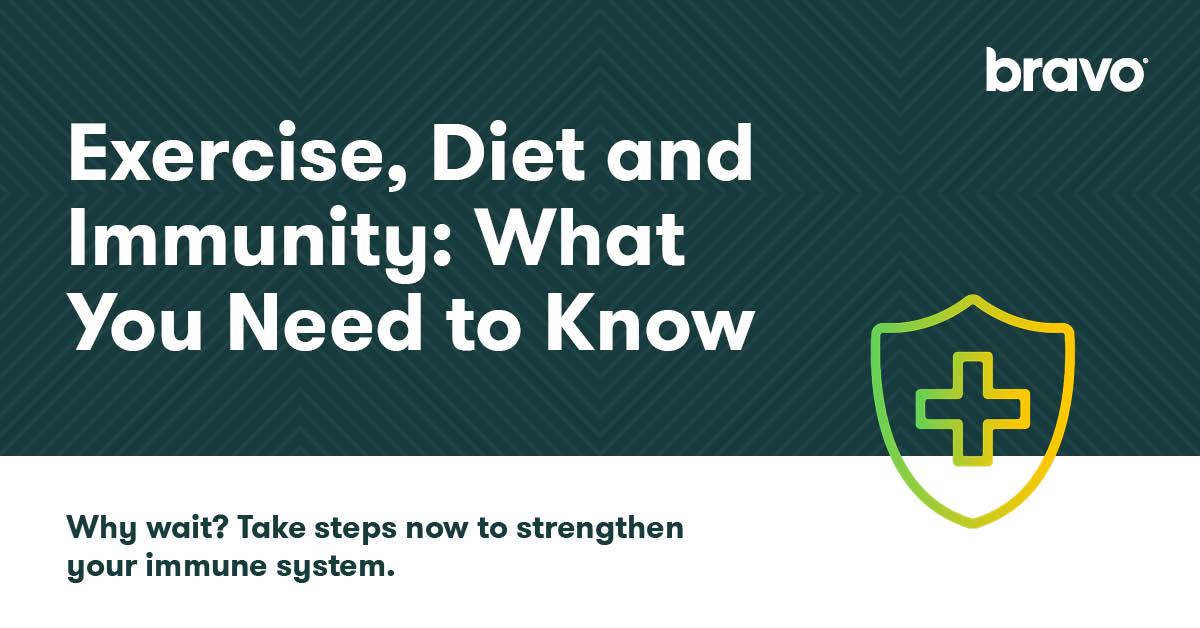Written by Bravo Wellness Strategists, Nicole Grasso, MS and Abby Saponaro, MS, RDN, LD
We tend to worry about things like seasonal colds, sinus infections and the flu as the fall season approaches. As others around us become ill, we quickly react deploying common remedies like increased vitamin C, probiotics, and chicken noodle soup. But what if we started preparing our bodies to fight illness before flu season hits?
It may seem strange to think about colds and flu in June when many of us have our best seasonal weather and low instances of germ volume. But now is actually an ideal time to look at your nutrition and exercise habits to set yourself up for success when the seasons change.
Before we jump in, it's important to know that there is no single source or “quick fix” to create a strong immune system because it’s exactly that – a system. Bravo has always believed lifestyle choices + reduced health risk + tracking of all health metrics empowers individuals to achieve success.
Relative to immune strength, studies1 consistently show that one should: eat a nutritious, balanced diet, avoid tobacco nicotine use, exercise regularly, maintain a healthy weight, get adequate sleep and reduce stress.
Here are some additional, specific benefits about how physical activity and a healthy diet can help our bodies fight illness and infection all year round.
What You Should Know About Exercise and Immunity
-
Exercise may cause a change in antibodies2 to circulate faster, so that white blood cells can detect illness sooner.
White Blood Cells (WBC) are the powerhouse cells that fight disease in your body. When presence of WBC count is high, it is indicative that you are fighting off something foreign to the body. While you may not be able to use exercise to prevent infection, your body may be able to react sooner. It’s like the check engine light coming on before you are broken down on the side of the road. -
Exercise can help fight cortisol spikes triggered from isolation.
While the economy is slowly reopening, it’s fair to be apprehensive about exercising in parks and recreation centers. Stress is especially high during quarantine, which means cortisol levels are higher than usual. This, unfortunately, means immune strength is compromised. But every single time you exercise, (notably cardiorespiratory) the body becomes its own powerhouse, mobilizing billions of immune cells! The key here is that exercise has shown time and again to have a positive impact on the cells of the immune system AND reduce the cortisol spikes triggered from isolation. There is no way to 100% avoid exposure to the virus, and/or the need to isolate for safety. However, we can offset the adverse reactions if one contracts the virus and/or suffers from chemical stressors due to isolation by consistently engaging in exercise₃.
What You Should Know About Nutrition, Diet and Immune Health
As noted above, the immune system is exactly that, a complex system of cells, proteins, tissues, and organs that work together to defend the body against attacks. As much as we would all love to take a supplement and have our immune system boosted, unfortunately it doesn’t work like this. It is also highly unlikely that individual foods can “boost” the immune system. Even though a supplement or single food can’t make a significant difference for your immune system, we know that certain dietary patterns can support your health and better prepare your body for a battle.
A dietary pattern refers to foods to include in your diet and, equally important, foods to avoid on a regular basis. Here are some nutrition recommendations we should be following year-round to support our body’s defense system.
-
Limit salt intake.4, 5
The best way to do this is limit the amount of times you dine out and limit the amount of processed foods you consume. The majority of sodium intake in a typical U.S. diet comes from sodium added to food outside the home (restaurants and processed foods)6. It is well established in the literature that a diet high in sodium is associated with elevated blood pressure7. We also have evidence that excessive salt intake may have a negative effect on the immune system5.
-
Limit added sugar intake.
Scientific evidence suggests excessive sugar intake when coupled with sedentary lifestyle and too many calories may lead to heart disease and contribute to an increase risk of type 2 diabetes.8 In order to get adequate nutrients to support overall health from fruits and vegetables, it is important to limit foods with added sugars that in turn replace the nutrient dense foods we should be consuming regularly.
-
Eat a variety of colorful plant-based foods to ensure adequate nutrient intake.
See the chart below for specific nutrients regularly researched for association with immune health. No supplement has been shown to boost immune health at this time. Always ask your doctor before taking a supplement of any of the following nutrients. Too much can be a bad thing!
*The food sources lists are not exhaustive. Many other plant-based foods contain these nutrients and more.
|
|
Function |
Some Food Sources |
Protein |
Build and repairs body tissue and cells critical for immune system |
Lean meat, lean poultry, seafood, eggs, beans, nuts, seeds, tofu |
Vitamin A |
Helps regulate the immune system and fight infections by supporting skin and tissue health |
Sweet potato, spinach, carrots, cantaloupe, peppers, mangos, broccoli, squash, tomato products |
Zinc |
Promotes cellular reproduction and synthesis of new immune system cells |
Oysters, crab, beef, lobster, beans, fortified breakfast cereal, pumpkin seeds, yogurt |
Vitamin D |
Activates and regulates immune system cells |
Cod liver oil, trout, salmon, mushrooms, fortified milk, sunlight exposure |
Vitamin C |
Plays a variety of roles in immune function |
Bell peppers, oranges, kiwi, broccoli, strawberries, brussels sprouts, grapefruit, cauliflower |
Vitamin E |
Acts as an antioxidant and helps fight off invading bacteria and viruses |
Vegetables oils, nuts, seeds, green vegetables, fortified foods like breakfast cereals |
Selenium |
Involved in initiating immunity and also involved in regulating excessive immune responses and chronic inflammation |
Brazil nuts, yellowfin tuna, halibut, sardines, shrimp, cottage cheese, brown rice, oatmeal |
Omega-3 fatty acids |
Support health immune system |
Salmon, herring, sardines, mackerel, flaxseed oil, chia seeds, English walnuts |
Additional Clinical Insights and Coaching on How to Improve Immune Health
On our recent webinar, we spoke with Dr. Leonard Calabrese of the Cleveland Clinic Center for Immunology about how personal behavior impacts your immune health, touching on the research listed here and more. For additional details on how you can improve your immune system functioning and reduce risk of chronic disease and infections like COVID-19, watch the webinar recording. And, stay tuned for more information from Cleveland Clinic and Bravo about the new Cleveland Clinic Immune Health coaching program.
Sources:
1https://www.health.harvard.edu/staying-healthy/how-to-boost-your-immune-system
3https://www.acsm.org/blog-detail/acsm-blog/2020/03/30/exercise-immunity-covid-19-pandemic
4https://www.hsph.harvard.edu/nutritionsource/nutrition-and-immunity/
5 University of Bonn. "Too much salt weakens the immune system: A diet rich in salt weakens the antibacterial immune defense." ScienceDaily. ScienceDaily, 25 March 2020. <www.sciencedaily.com/releases/2020/03/200325143815.htm>.
6https://www.ahajournals.org/doi/full/10.1161/circulationaha.116.024446
7 Huang Liping, Trieu Kathy, Yoshimura Sohei, Neal Bruce, Woodward Mark, Campbell Norm R C et al. Effect of dose and duration of reduction in dietary sodium on blood pressure levels: systematic review and meta-analysis of randomised trials BMJ 2020; 368 :m315



